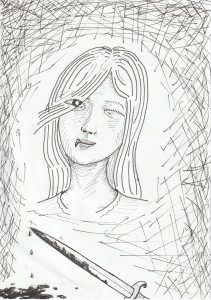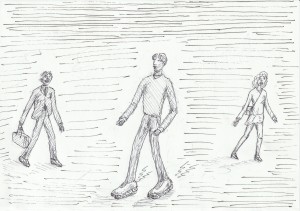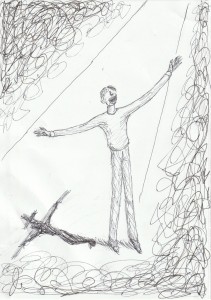はじめに、誤解を防いでおきます
2020年11月
ここまでの各ページをお読みいただくと、「原発を持つと、すぐに核兵器も持てるようになるんだな」といった誤解をされる方々もいらっしゃるかも。私はここまで、「すぐに/簡単に」原発 → 核兵器と発展できると主張しては、来なかったハズです。
あくまでd-x)(発電原理)の各ページで説明したように、原理的には核兵器製造と核発電とは仕組みが不可分だ、と言いたいのですね。
実際に核兵器を作るには、(原理的にではなく)技術的な問題があって、
・ プルトニウム型原爆の場合 プルトニウム239の濃度を高める、implosion(爆縮)という起爆のための技術
・ ウラニウム型原爆の場合 ウラニウム235の濃度を90%以上に高める(濃縮)
がそれぞれ必要なのです。
しかしこうした技術的課題はとっくに乗り越えられており(だからこそ、1945年に広島と長崎に原爆が落とされたのですね)、原発を稼働させるうちにウラニウムやプルトニウムを扱うための技術を当然、身に着けられることも確かです。
だからこそ、核発電を導入する・した諸国をIAEAは監視しており、特にウラン濃縮や使用済み核燃料の再処理(プルトニウムが得られる)には目を光らせるわけですね。
(ついでながら、日本はそのどちらもやってます。六ケ所村の再処理工場はニュースなどで有名ですし、同じく六ケ所には日本原燃のウラン濃縮工場もあります。国外の核問題関係者から見れば、充分に”怪しい国”なのですね。これについては、また後日)
バラカ
で、ペルシャ湾岸諸国の話に戻ると、サウディよりも先にUAEが核発電所(原発)の導入と稼働開始に成功しました。この8月のことで、「原子力産業新聞」も報じています。(https://www.jaif.or.jp/journal/oversea/4100.html )
もちろん発電用で、Al Jazeeraの “Nuclear Gulf: Experts sound the alarm over UAE nuclear reactors” という記事(Patricia Sabga, 2020年7月15日)にも、以下のようにあります。
(https://www.aljazeera.com/economy/2020/7/15/nuclear-gulf-experts-sound-the-alarm-over-uae-nuclear-reactors )
The UAE is adamant its intentions are peaceful. It has agreed not to enrich its own uranium or reprocess spent fuel, and has signed up to the IAEA’s Additional Protocol, significantly enhancing the agency’s inspection capabilities.
(UAEは、この原発を建築した意図は平和的なものだと主張して譲らない。自国ではウラニウム濃縮や使用済み核燃料の再処理を行わないことに合意しており、さらにIAEAの追加議定書にも同意している。この追加議定書に同意すると、IAEAによる査察権限を大幅に高めることになる)
UAEとサウディ以外にも、ヨルダン(https://www.world-nuclear.org/information-library/country-profiles/countries-g-n/jordan.aspx )
や エジプト(https://www.world-nuclear.org/information-library/country-profiles/countries-a-f/egypt.aspx )
でも、核発電導入の動きはありました。
(ついでに、リビアでは頓挫しています。後日、説明)
何で、ワザワザ核発電を?
しかし、ここで変だと思いませんか?雨が少なくて日光に恵まれたこうした諸国で、この「post-Fukushima時代」に、なぜわざわざ核発電を?太陽光発電のコストは大きく下がっているのに?原発建設には、巨大な初期投資が必要なのに??
そう不思議がっているのは、私だけじゃありません。上記の “Nuclear Gulf: Experts sound the alarm over UAE nuclear reactors” という記事も、次のように指摘しています。
Between 2009 and 2019, utility-scale average solar photovoltaic costs fell 89 percent and wind fell 43 percent, while nuclear skyrocketed 26 percent, according to an analysis by the financial advisory and asset manager Lazard.
(2009年から2019年の間に、発電所規模の太陽光発電のコストは89%、風力のコストは43%も低下した。一方、原子力発電のコストは26%もの高騰を示した。これは、金融アドバイスと資産運用の企業であるLazard社の分析による数値だ。 * Al Jazeeraのウェブページで上記のテキストのすぐ下にある折れ線チャートも、ぜひご覧ください)
According to the forthcoming 2020 edition of the WNISR, the latest contracted solar photovoltaic power purchase agreement for the fifth-phase Dubai solar park came in under two cents ($0.02) per kilowatt-hour (kWh). Barakah’s projected levelized cost of energy (lifetime costs divided by energy production) back in 2012 was a little over seven cents ($0.07) per kWh.
(World Nuclear Industry Status Report [世界原子力産業現状報告書] という報告書の2020年版が近く公表されるが、それによればドバイの太陽光発電パークの第5期太陽光電力購入合意が最近締結された。そのコストは、1キロワット時(kWh)あたり2セント(約20円)を下回っていた。2012年の時点で予想したバラカ原発の平準化エネルギー コストつまり原発の生涯全体のコストをエネルギー産出量で割ったものは、1kWhあたりで7セント(約70円)を少し上回っていた)
こうなると、やはり「潜在的な核武装能力」も疑わざるを得なくなります。このAl Jazeeraの記事も、以下のようにそれを指摘しています。長くなりますが、引用しますね。
Proliferation concerns
Whenever the words “nuclear” and “Middle East” are uttered in the same sentence, a discussion about proliferation risks is almost surely bound to follow because nuclear technology is dual-use.
“The tense geopolitical environment in the Gulf makes nuclear a more controversial issue in this region than elsewhere, as all new nuclear power provides the capability to develop and make nuclear weapons,” Dorfman notes.
(核兵器拡散に関する憂慮事項
nuclearつまり「核・原子力」という言葉とMiddle Eastつまり中東という言葉とが同じ文の中に登場すると、核兵器拡散のリスクに関する議論がそのあとに続くのは、ほとんど必然である。これは、核技術とは発電と軍事の両方を兼ね備えた諸刃の刃だからだ。
「世界のどこよりもこのペルシャ湾岸地域では、その地政学的な緊張のため、核・原子力というと議論沸騰の問題となる。これは、原子力発電を新たに始めると必ず、核兵器を開発し製造する能力も得られてしまうためだ」と、Dorfman(訳注: Nuclear Consulting GroupのPaul Dorfman博士のこと)は指摘している)
—-
A cold war between Saudi Arabia and Iran has opened multiple faultlines. The air, land and sea blockade of Qatar by Saudi Arabia, the UAE, Bahrain and Egypt just entered its fourth year. The civil wars in Syria and Libya are also regional and international proxy wars. Anti-government demonstrations erupted last year in Lebanon, Iraq, Iran, Algeria, Egypt, Jordan, Morocco, Palestine and Tunisia. There has been no progress in resolving the more than half-century-old Palestinian-Israeli conflict. And the COVID-19 pandemic is causing painful economic disruptions that are already fueling more discontent.
(サウディアラビアとイランの間の冷戦のため、断層がいくつもできてしまった。サウディとUAE、バーレーン、エジプトは陸海空のすべてでカタールを封鎖しているが、それも4年目に入った。シリアとリビアの内戦も、中東での国際的な代理戦争である。昨年(2019)、レバノンやイラク、イラン、アルジェリア、エジプト、ヨルダン、モロッコ、パレスティナ、チュニジアでも反政府デモが発生した。パレスティナとイスラエル間の対立はすでに半世紀以上続く問題だが、解決に向かう発展はまったく見られない。さらにコロナウィルスの蔓延のため経済も苦境に陥っており、そのため既に不満が一層募っている)
For years, the lightning rod for Middle East nuclear proliferation discourse has been Iran and the slowly unraveling deal with world powers to keep Tehran’s nuclear programme in check.
(もう何年も、中東での核兵器拡散を論じる際の中心的問題点といえばイランであり、世界の諸大国がテヘランの核開発プログラムをやめさせようと努めてきたが、交渉はなかなか進まない)
The Middle East is not a region where trust on matters nuclear is easily extended by the international community. And for good reason. Israel has never admitted to possessing nuclear weapons even though it is widely believed to have them. Iraq had a covert nuclear weapons programme that was gutted after the 1991 Gulf War. Libya admitted in 2003 that it had a clandestine nuclear programme that was subsequently dismantled. Algeria admitted in the early 1990s that it had constructed a nuclear research reactor with China’s help. And though Iran insists its nuclear programme has never been military in nature, it did admit in 2002 that it had built nuclear facilities that were not declared to the IAEA.
(中東という地域は、国際社会が核関連の事項に関する信頼を容易に打ち立てられるような地域ではない。それには、それなりの理由がある。イスラエルは核兵器を保有していると多くの諸国が見ているのだが、イスラエル自身はそれを認めたことがない。イラクはかつて秘密の核兵器開発プログラムを進めていたのだが、1991年の湾岸戦争の後で暴露された。リビアは2003年、それ以前に秘密裏の核兵器開発プログラムを行っていたが廃止したことを認めた。1990年代初頭、アルジェリアは中国からの支援で研究用原子炉を建設したことを認めた。そしてイランは、自国の核開発プログラムはその性質上、一度たりとも軍事目的には供されていないと主張して譲らないが、ある核施設を建設しており、しかもそれをIAEAに告知していないことを2002年に認めている)
Understandably, the UAE has tried to distance itself from bad behavior – real or perceived – of its regional cohorts.
(UAEはそうした周辺諸国の悪戯を真似ないよう、また真似ていると誤解されないよう、距離を置いてきた。それは、理解できることだ)
Most recently, the UAE’s ambassador to the US, Yousef Al Otaiba, wrote an op-ed published in the Wall Street Journal reminding the world that the UAE had opted to “forgo domestic enrichment and reprocessing of nuclear material”, and has agreed to let the IAEA inspect its nuclear facilities on short notice.
(ごく最近のことだがUAEの対アメリカ大使ユーセフ アル オタイバ氏による論説を、ウォーストリート ジャーナルが掲載した。それはUAEが「自国でのウラニウム濃縮と核物質の再処理とを放棄している」ことを、世界に思い起こさせるものであった。さらにUAEは、通知を受けて短期間でIAEAが同国の核施設を監査することにも同意している)
—–
But concerns still linger.
“Since new nuclear makes little apparent sense in the Gulf, which has some of the best solar energy resources in the world, the nature of the interest in nuclear may lie hidden in plain sight,” Dorfman noted in a report he authored on Barakah.
Sokolski also has questions about Middle East nuclear energy ambitions. “If they want electricity, this is a very poor way to do it,” he said, noting the abundance of alternative energy sources the UAE and other countries in the region with nuclear power plants under development could harness including natural gas, sun and wind. “Building a nuclear power plant would be like number 58 on your top five things to do, and that they’ve chosen to focus on this [nuclear] is suspect.”
(それでもなお、疑いは残る。
Dorfmanがバラカ原発に関して記した報告書には、「ペルシャ湾岸諸国には世界でも有数の太陽光エネルギーがあるので、新たに原発を建ててもあまり意味はない以上、そもそも何のために原子力に関心が向かうのか、容易にはわからない」とある。
Sokolski教授(訳注: Henry D. Sokolski教授のこと。 https://en.wikipedia.org/wiki/Henry_D._Sokolski 参照)も中東諸国の核・原子力に対する野望に関し、疑問を投げかけている。「電気が欲しいのなら、原発とは実に下手な発電方法だ」と彼は言う。UAEその他の原発開発中の湾岸諸国には、原発以外のエネルギー源が潤沢にあることを、同教授は指摘している。たとえば、天然ガス、太陽光、風力などだ。彼によれば、「大切な用事のリストトップ5があるとすれば、原発とは58番目の用事程度のものにすぎない。それなのに原子力を選んだということは、疑いを招く」)
やれやれ。。
では、次のページf-7) では、上記のような「危うい地域」に原発を売り込みに行き、結局は売れなかった哀れなセールスマンの話と、エジプトやヨルダンの例を。
お勧めのビデオ
“Why is the Gulf going nuclear?” というそのものズバリのビデオを、YouTubeでご覧になれます。Al Jazeera EnglishのStart Hereというニュース解説シリーズの10分程度のビデオで、場所は次の通り:
https://www.youtube.com/watch?v=ybdwXo14sQI
ただし、Al Jazeeraは皆様もよくご存じのとおりカタール政府の出資による放送局で、そのカタールは今のところ(2017年ごろから)サウディやUAEとは外交上絶縁状態にあることは、頭に入れておいてご覧くださいませ。
それでも、「平和利用」(原発)と軍事利用との不可分性は、国家間の外交関係とは無関係な問題ですよね。このビデオも、その不可分性を指摘してくれています。




